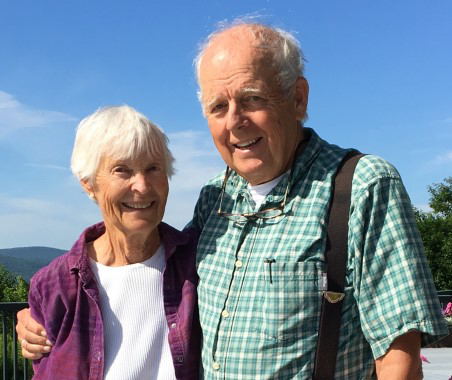Mission & History
Learn more about who we are—and why we do what we do
Our Mission
Farm Direct Co-op is a community oriented, member based organization with the goal of supporting local growers and artisans while providing the freshest local and organic food available.
Farm Direct Coop Roots
The FDC was founded in 1993 by Richard “Pic” Harrison and Sarah Lincoln-Harrison. Our esteemed founders are enjoying retirement on their organic farm, True North, in Montville, ME.

A Brief Early History of the Farm Direct Coop (FDC)
BY SARAH LINCOLN HARRISON
Did you know that the FDC began in ’93 with a handful of families in search of a local organic farmer who could supply the group with produce during the growing season?
Did you know that the model we followed was called Community Supported Agriculture (CSA), a movement that started with buying clubs in Japan, made its way across Europe and arrived in the US in the ‘80’s?
It was still a revolutionary idea in ’92 when Pic and I were introduced to the concept during a course we took called Regional Sustainability at the Boston Architectural Center. We explored several broad aspects of what it means to live a sustainable lifestyle, including agriculture, water and air quality, solid waste, energy, transportation, community and population. At semester’s end we were inspired to bring back what we had learned to our own community and to begin making small changes in our personal habits.
The easiest action was to rent a few compact fluorescent light bulbs (SL 18’s and big clunkers they were!) for 20 cents a month from the Marblehead Municipal Light Department. An equally easy step was to reflect on our eating habits, reduce our use of processed foods and turn to a locally grown source of fresh produce. During the sustainability course we had learned of the Natick Community Organic Farm and through their contact found Edith Maxwell, a certified organic grower in W. Newbury who agreed to supply us, CSA style, with produce for a 26-week season. This involved paying her up front $300 for our one-size-fits-all share of vegetables, herbs, flowers and a small number of fruits, mainly blueberries and grapes. I remember she did supply us with fantastic vinegars and garlic as well. Each Friday, we took turns driving up to W. Newbury to pick up the filled bags she left in her garage. Thankfully, she slipped in a sheet of recipes, since none of us had tasted mizuna, kohlrabi or could identify the different squashes.
By the end of that first season, we had piqued the interest of a number of friends who wanted to join the following year. Edith, limited by her one acre and two young children, was unable to grow with us. She referred us to another organic grower in the area, Dick Rosenburgh, who was supplying the Beverly Farmers’ Market. We were able to convince Dick that a guaranteed income for a share of his harvest would be in his best interest and we had no trouble producing the 22 families who signed on for ’94. Early that year we added to our leadership Don Morgan who brought excellent managerial and financial skills and an ebullient personality, all valuable assets in supporting our evolving mission. It was clear that, in addition to eating and fostering relationships with local farms, we were called to support a new level of community that valued a sustainable lifestyle.
Right from the start there was something unusual about our Marblehead Eco-Farm CSA. Instead of initiating with the farmer, the impulse came from a group of suburban consumers most of whom had never even visited a farm but who were intrigued by the idea of supporting local farms and eating freshly harvested produce. Dick liked the CSA concept which guaranteed him income and a willingness on our part to share the risk in the event of a crop failure. It also meant that during some stretches we received seven straight weeks of chard, an over-abundance of large spicy black Spanish radishes or enough ripe tomatoes to feed an army. In order to strengthen the farmer/consumer relationship, we began to make trips to Dick’s farm, assisting with harvesting and end of season cleanup. In ’97 and ’98, we even managed to do the harvesting and delivery of produce while Dick took his family on a well-earned two-week vacation to Cape Cod!
A nice addition, unusual for the traditional CSA, was Dick’s partnership with his next door neighbor, Glen Cook, whose orchards offered us a variety of fruits and award-winning cider. By 1996, we further departed from the traditional CSA model by expanding our farmer base to meet our growing membership. By 1996 it was clear that we needed another organic farmer. In August Pic and I attended the annual summer conference of the Northeast Organic Farming Association (NOFA) at Hampshire College in Amherst. We posted a request on the community bulletin board for a grower for the 1997 season. Shortly thereafter, we received a call from DeWitt Thomson, an ambitious young local farmer who was willing to take a chance on consumers who lived two hours distant, provided we did the transportation.
By then end of the 1996 season, our fledging operation had incorporated as the Marblehead Ecofarm CSA with a steering committee, a paid depot coordinator of operations and our membership had reached 240. We were being supplied by three major farms and an occasional small producer.
In the next installment you’ll hear about moving to a year-round manager, our expansion to the surrounding communities and our commissioning of a Harvest Folk Cantata. If you are interested in learning more about the history of the CSA movement in the U.S.A., Google is a good place to start.
